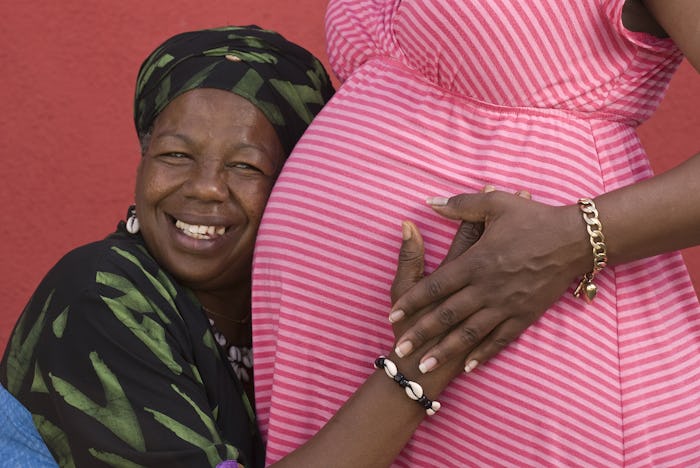The way we experience pregnancy sure has come a long way since our great grandmothers, grandmothers, and even mothers had babies. For one, the field of medicine has changed and we've made a slew of scientific and technological advances that altered how we treat pregnancy and childbirth. The status of women has also changed, as have the roles men play. So, the knowledge that we take for granted as pregnant ladies in the 2010s was unheard of in the old days, and the ways your great-grandma’s pregnancy was different than yours are pretty incredible when you really and truly look back and take stock on our collective, changed experiences.
Of course, there are likely some similarities between how your great-grandmother had babies and how you have (or will, if you’re pregnant right now) bring another human being into the world. The fetus still grows in the uterus, and the belly still expands to mind-boggling proportions. Morning sickness still hasn’t gone away. Cravings have likely always existed, though what we crave has probably changed. Then, of course, much of what may or may not be different will depend on where your great-grandmother was living when she gave birth. My tatarabuelas (great-grandmothers, in Spanish) lived in Nicaragua and Mexico, so their experiences aren’t paralleled to those of great-grandmothers who lived here in the United States.
All that said, some of these differences are more or less across the board no matter where you and your great-grandmum are from. While it's pretty awesome to be able to look back and say, "Hey, I experienced that, too!" it's also worthwhile to look at how things have evolved.
She Might Not Have Understood How She Got Pregnant
Sex education is not something your great-grandmothers received in school, and chances are they didn’t get much of it at home, either. While our sex ed is still lacking here in the United States (and even in the year 2017), it was purely nonexistent when your great-grandmothers were around. Hell, some of our great-grandmas didn’t even go to school.
There Was Really Only One Way To Get Pregnant
Back in the day, pregnancy was caused by a penis ejaculating in (or ver near the opening of) a vagina. The first reported case of artificial insemination is from the late 1800s, but these procedures were rare (and continued to be rare for a while). These days, we have many ways to get pregnant. Hurray, science!
She Didn't Have Regular OB-GYN Visits
These days, most of us have cars or access to public transportation, but back in the day women didn’t always have the ability to visit a doctor. Really, when your great-grandmother gave birth, there’s a good chance she was seeing a midwife instead of an OB-GYN, too. These days, pregnant folks have the option of using either (or both)!
She Didn't Have Ultrasounds (Or Other Advanced Screenings)...
Ultrasound machines weren’t commonplace until the 1950s. This means there was less need for pregnant women to come into the doctor’s office in the first place (if at all). These days, we can see the fetus grow, we can check for possible birth defects, and we can even determine the sex (to an extent).
...Meaning If There Were Any Defects, There Was No Way To Treat Them Or Come Up With A Plan
Back then, when you got pregnant you didn’t get to know much about your future child until you had the baby. Now we have the ability to monitor a fetus for things like heart defects, or find out if our baby might have chromosomal disorders. Parents can then make choices for treatment accordingly.
She Probably Had Some Non-Scientific Methods To Try And Figure It Out The Sex
We place a lot of emphasis on the sex and gender of our babies-to-be these days. Back in your great-grandmother's day, moms-to-be couldn’t find out for sure, so they had other ways to figure this out.
My mom told me about one method where you would lay on your back and someone else would stand above you with a wedding ring tied to a string. If it moved circular, it was a girl, and if it was side to side, it was a boy. (Except not really because gender is a social construct and there’s no scientific basis for determining sex via string anyway.)
There’s A Good Chance She Continued To Indulge In Vices (If She Had Any)
Drinking. Smoking. These things were not seen as a big deal back in the day, even if you were pregnant. Nowadays, we know better.
She Definitely Didn’t Read The Baby Books
No, great-grandmomma wasn’t reading What To Expect When You're Expecting, or any other such books. Mainly because there weren’t many pregnancy and childbirth books to begin with. These days, there are more books than you can list.
She Didn’t Have Pain Medication Options
Lidocaine. Demerol. Bupivacaine. Fentanyl. You can treat your labor pains with a slew of medications (or choose to not use any at all). But our great grandmothers? Yeah, they had no choice.
Her Partner Was Probably Hardly Involved Past Procreation
Chances are your great-grandpa was in the living room reading the paper or at work or smoking a cigar (or something), while your great-grandma pushed a human being into the world. Men weren’t really expected to hang around and coach their wives. Also, I say great-grandpa and wives because it was conceivably more difficult for single-sex couples to have children together in those years. Fortunately, this is no longer the case.
